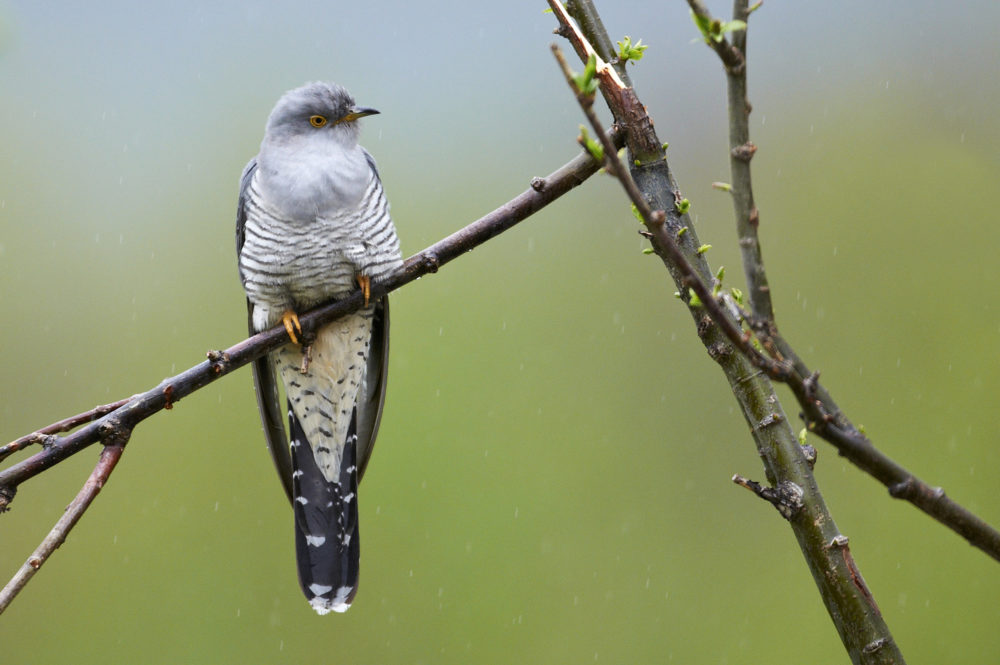Satellite-tagged Cuckoos clocked crossing continents

The instantly recognisable song of the Cuckoo was once a familiar summer sound across much of the UK. Sadly, we have lost more than a third of our Cuckoos in the past 25 years, but the reasons why are still not fully understood.
Satellite technology is helping researchers from the British Trust for Ornithology (BTO) to better understand the pressures these remarkable birds face as they migrate to central Africa and back.
Since 2011, the British Trust for Ornithology (BTO) has fitted more than 120 Cuckoos with state-of-the-art satellite tags to unravel the mysteries of their migrations and help their conservation.
Challenges
BTO scientists studying these enigmatic birds are hoping to gain a clearer understanding of the consequences of the routes the birds take and how they may respond to the many challenges they encounter along the way.
Cuckoos are classic summer visitors, arriving here in spring from their wintering grounds around the African Congo. Unlike other migratory birds, these long-distance travellers do not build nests and raise their young themselves. Cuckoos are what are known as brood parasites; they lay their eggs in other birds’ nests and let the unwitting foster parents do all the hard work raising the chick.
But Cuckoo numbers have plummeted across much of the UK and Ireland in recent years and BTO scientists are trying to determine the causes.
Curiously, Cuckoo numbers in Scotland are bucking the trend and researchers are seeking to further understand just why these birds are doing so well, compared to their Cuckoo counterparts elsewhere in the UK.
Discoveries
Among the many important discoveries of the Cuckoo tracking project so far, is the finding that UK Cuckoos take two different migration routes to get to the same wintering grounds in tropical Africa.
All of the Cuckoos tagged in Scotland and other areas of upland Britain and Ireland take an easterly route via Italy when heading south, and have a significantly higher survival rate than those taking a westerly route via Spain. Cuckoos from elsewhere can take either route, but those moving westwards through Europe tend to fare worse.
By comparing the relative success of some Cuckoos over others, the BTO scientists hope to identify the impact of conditions here in the UK versus those encountered on migration on Cuckoo population trends.
Are the differences between Scotland and the rest of the UK wholly down to the birds’ migration routes, or are some birds also facing challenges closer to home?
“Risky migrations”
Cuckoos eat large insects and caterpillars, and a reduction in these food items both on the breeding grounds and along their migration route will impact on their survival rates.
As they prepare to cross the Mediterranean and the vast expanse of the Sahara Desert, the south-bound Cuckoos need to be well-fed and healthy.
Drought, excessive rainfall and forest fires, all exacerbated by the impacts of climate change, along their migration routes add to the birds’ obstacles.
It is also clear that the timing of the Cuckoos’ arrival in the UK in spring is constrained by conditions at the stopovers that they use in West Africa, prior to heading over the Sahara, which they do in one continual non-stop flight. This can result in the birds taking risky migrations that may result in higher mortality, particularly if the birds are not in peak physical condition at the time of departure.
During May and early June 2024, BTO experts tagged a further nine Cuckoos in England and Scotland. This group of amazing birds will hopefully provide more invaluable insights, shedding further light on the worrying declines of our Cuckoos.
Armed with a greater understanding, conservationists may be able to safeguard their future, so that future generations can enjoy hearing that distinctive ‘cuck-coo’, for years to come.
Dr Chris Hewson, lead scientist on the project, said: “It’s fantastic to see 9 more Cuckoos heading off with satellite tags newly fitted. These birds will help us to better understand the factors that determine their survival rates and hence the reasons for the population declines they are undergoing in large parts of the UK.
“Ultimately, we need to know how we can help them to successfully complete their arduous migrations in the rapidly changing world we share.”
You can follow the tagged Cuckoos as they make their way through Europe toward their African wintering grounds and back here: www.bto.org/cuckoos
Support our Nation today
For the price of a cup of coffee a month you can help us create an independent, not-for-profit, national news service for the people of Wales, by the people of Wales.





